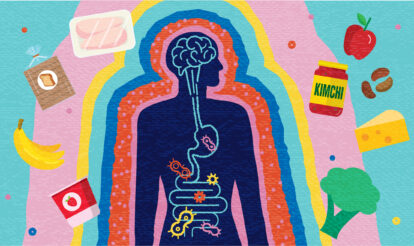
Supporting infant gut health – what every new parent should know
Supporting infant gut health – what every new parent should know

Why is a baby’s gut microbiome so important?
A baby’s gut microbiome begins to develop before birth and changes rapidly over the first three years of life, gradually resembling an adult’s. This early period influences digestive health, immune development, and metabolism, with potential long-term effects on overall wellbeing.[1]
Pregnancy and the first 1,000 days
Before birth and during the first three years of life, the gut microbiome changes in ways unlike any other time in life. This is a ‘critical developmental window’ when an infant’s gut bacteria are especially sensitive to internal and environmental influences.[2]
A number of factors contribute to the shaping of the gut microbiome during this time, including a mother’s gut health, the baby’s nutrition, and the mode of delivery.
- Mode of delivery
Vaginal birth exposes the infant to maternal vaginal and gut bacteria, particularly Lactobacillus, which help establish the initial microbiota. Babies born via Caesarean section miss out on some of this early microbial exposure, which is often associated with lower microbial diversity and reduced levels of beneficial species such as Bacteroides and Bifidobacterium.[3]
- Gestational age
Babies born prematurely often have lower microbial diversity and delayed colonisation compared to those born full-term. Premature infants also often require medical interventions such as antibiotics, which can affect immune system maturation and gut barrier function.[4]
- Maternal microbiome and health
The bacteria within the mother’s gut, vaginal canal, and breastmilk contribute to the ‘seeding’ of her baby’s microbiome. Imbalances due to an unbalanced diet during pregnancy, obesity, gestational diabetes, and other causes of inflammation have been linked to increased risk of dysbiosis in the baby.[5]
- Breastfeeding vs formula
Breastmilk is a key source of beneficial Bifidobacterium, prebiotics, and immune-regulating compounds that contribute to a baby’s microbiome. While some modern formulas are fortified with probiotics and prebiotics, the gut microbiome of formula-fed infants often differs from that of breastfed infants.[6]
- Antibiotic exposure
While sometimes medically necessary, antibiotic use during pregnancy, delivery, or infancy may reduce microbial diversity, delay colonisation of key microbes (Bifidobacterium), and potentially increase the risk of dysbiosis in young babies.[7]
Practical, evidence-based strategies to support a baby’s microbiome
A healthy infant gut microbiome supports the development of immune defences, aids digestion, influences brain and cognitive development, and contributes to overall growth and wellbeing.
Consider when to introduce solid foods
The introduction of solid foods dramatically changes the microbiome, marking the first steps to resembling the adult microbiome. Species that break down complex carbohydrates and synthesise nutrients begin to develop and colonise the gut.[8]
Research has suggested that introducing solids by four months may be linked to greater acceptance of varied foods later in life and a lower risk of certain allergies. However, health authorities generally recommend introducing solids around 4-6 months, depending on individual circumstances.[9] High-fibre foods such as mashed fruits, vegetables, and legumes are often recommended, as they help support the quality and quantity of bacteria in the gut.[10]
Why a varied diet matters
The diversity of solid foods may increase gut microbial diversity and help reduce the risk of developing certain food allergies.[11] A large study involving 1,303 infants found that introducing six allergenic foods (peanut, cooked egg, cow’s milk, sesame, whitefish, and wheat) at four months was associated with a lower risk of developing food allergies by age three. Only 2.4% of these children developed an allergy, compared to 7.3% of those who were introduced to the same foods after 6 months.[12]
A similar study found that infants who were given allergenic solids between 3 and 6 months (while still exclusively breastfed) experienced significant increases in overall microbial diversity, including higher numbers of beneficial species.[13]
The importance of natural bacteria
Where appropriate, exposure to a wide range of natural bacteria in early life can also contribute to microbial development.
Some research has shown that children growing up in farm environments are less likely to be affected by health conditions (particularly asthma).[14]
Conversely, the ‘hygiene hypothesis’ suggests that children raised in highly sanitised environments have less exposure to beneficial microbes, and also appear to have increased risk of developing immune-related conditions such as allergies.[15]
When to consider probiotics
While most children develop a healthy gut microbiome naturally through diet and environment, probiotic supplementation may be beneficial in certain situations. Research suggests that supplementation with specific strains of Lactobacillus and Bifidobacterium may help restore microbial balance and support immune development. However, probiotic use should be tailored and discussed with a healthcare professional.[16]
A 2023 study found that infant formula fortified with probiotics similar to those in breast milk helped to optimise the balance of gut bacteria and overall gut health in babies.[17]
Lactobacillus rhamnosus and Saccharomyces boulardii may be effective in reducing diarrhoea and gastrointestinal illnesses in children.[18] These strains have been shown to support gut barrier function and help reduce fluid loss.[19]
Skin conditions linked to dysbiosis, such as atopic dermatitis, may also benefit from probiotic supplementation, particularly Lactobacillus rhamnosus.[20] However, further research is pending.
Every child is different, and every child’s birth, diet, and environment is different. Supporting microbiome development in the first few years of life may offer long-term health benefits.
Always seek professional medical advice before making significant changes to a child’s diet.
References
[1] Laursen MF, Bahl MI, Licht TR. Settlers of our inner surface – factors shaping the gut microbiota from birth to toddlerhood. FEMS Microbiol Rev. 2021 Aug 17;45(4):fuab001. doi: 10.1093/femsre/fuab001. PMID: 33428723; PMCID: PMC8371275.
[2] Laursen MF, Bahl MI, Licht TR. Settlers of our inner surface – factors shaping the gut microbiota from birth to toddlerhood. FEMS Microbiol Rev. 2021 Aug 17;45(4):fuab001. doi: 10.1093/femsre/fuab001. PMID: 33428723; PMCID: PMC8371275.
[3] Inchingolo F, Inchingolo AD, Palumbo I, Trilli I, Guglielmo M, Mancini A, Palermo A, Inchingolo AM, Dipalma G. The Impact of Cesarean Section Delivery on Intestinal Microbiota: Mechanisms, Consequences, and Perspectives-A Systematic Review. Int J Mol Sci. 2024 Jan 15;25(2):1055. doi: 10.3390/ijms25021055. PMID: 38256127; PMCID: PMC10816971.
[4] Ruiz L, Moles L, Gueimonde M, Rodriguez JM. Perinatal Microbiomes’ Influence on Preterm Birth and Preterms’ Health: Influencing Factors and Modulation Strategies. J Pediatr Gastroenterol Nutr. 2016 Dec;63(6):e193-e203. doi: 10.1097/MPG.0000000000001196. PMID: 27019409.
[5] Pantazi AC, Balasa AL, Mihai CM, Chisnoiu T, Lupu VV, Kassim MAK, Mihai L, Frecus CE, Chirila SI, Lupu A, Andrusca A, Ionescu C, Cuzic V, Cambrea SC. Development of Gut Microbiota in the First 1000 Days after Birth and Potential Interventions. Nutrients. 2023 Aug 20;15(16):3647. doi: 10.3390/nu15163647. PMID: 37630837; PMCID: PMC10457741.
[6] Mogoş, G. F. R., Manciulea, M., Enache, R.-M., Pavelescu, L. A., Popescu, O. A., Cretoiu, S. M., & Marinescu, I. (2025). Intestinal Microbiota in Early Life: Latest Findings Regarding the Role of Probiotics as a Treatment Approach for Dysbiosis. Nutrients, 17(13), 2071. https://doi.org/10.3390/nu17132071
[7] Kesavelu D, Jog P. Current understanding of antibiotic-associated dysbiosis and approaches for its management. Ther Adv Infect Dis. 2023 Feb 24;10:20499361231154443. doi: 10.1177/20499361231154443. PMID: 36860273; PMCID: PMC9969474.
[8] Vaishampayan PA, Kuehl JV, Froula JL, Morgan JL, Ochman H, Francino MP. Comparative metagenomics and population dynamics of the gut microbiota in mother and infant. Genome Biol Evol. 2010 Jan 6;2:53-66. doi: 10.1093/gbe/evp057. PMID: 20333224; PMCID: PMC2839348.
[9] Borowitz SM. First Bites-Why, When, and What Solid Foods to Feed Infants. Front Pediatr. 2021 Mar 26;9:654171. doi: 10.3389/fped.2021.654171. PMID: 33842413; PMCID: PMC8032951.
[10] Homann CM, Rossel CAJ, Dizzell S, Bervoets L, Simioni J, Li J, Gunn E, Surette MG, de Souza RJ, Mommers M, Hutton EK, Morrison KM, Penders J, van Best N, Stearns JC. Infants’ First Solid Foods: Impact on Gut Microbiota Development in Two Intercontinental Cohorts. Nutrients. 2021 Jul 30;13(8):2639. doi: 10.3390/nu13082639. PMID: 34444798; PMCID: PMC8400337.
[11] Lee BR, Jung HI, Kim SK, Kwon M, Kim H, Jung M, Kyung Y, Kim BE, Choi SJ, Oh SY, Baek SY, Kim S, Bae J, Ahn K, Kim J. Dietary Diversity during Early Infancy Increases Microbial Diversity and Prevents Egg Allergy in High-Risk Infants. Immune Netw. 2021 Nov 12;22(2):e17. doi: 10.4110/in.2022.22.e17. PMID: 35573149; PMCID: PMC9066009.
[12] Perkin MR, Logan K, Tseng A, Raji B, Ayis S, Peacock J, Brough H, Marrs T, Radulovic S, Craven J, Flohr C, Lack G; EAT Study Team. Randomized Trial of Introduction of Allergenic Foods in Breast-Fed Infants. N Engl J Med. 2016 May 5;374(18):1733-43. doi: 10.1056/NEJMoa1514210. Epub 2016 Mar 4. PMID: 26943128.
[13] Marrs T, Jo JH, Perkin MR, Rivett DW, Witney AA, Bruce KD, Logan K, Craven J, Radulovic S, Versteeg SA, van Ree R, McLean WHI, Strachan DP, Lack G, Kong HH, Flohr C. Gut microbiota development during infancy: Impact of introducing allergenic foods. J Allergy Clin Immunol. 2021 Feb;147(2):613-621.e9. doi: 10.1016/j.jaci.2020.09.042. PMID: 33551026; PMCID: PMC9169695.
[14] Tabilas C, Iu DS, Daly CWP, Yee Mon KJ, Reynaldi A, Wesnak SP, Grenier JK, Davenport MP, Smith NL, Grimson A, Rudd BD. Early microbial exposure shapes adult immunity by altering CD8+ T cell development. Proc Natl Acad Sci U S A. 2022 Dec 6;119(49):e2212548119. doi: 10.1073/pnas.2212548119. Epub 2022 Nov 28. PMID: 36442114; PMCID: PMC9894172.
[15] Klos B, Kaul A, Straube E, Steinhauser V, Gödel C, Schäfer F, Lambert C, Enck P, Mack I. Effects of isolated, confined and extreme environments on parameters of the immune system – a systematic review. Front Immunol. 2025 Mar 25;16:1532103. doi: 10.3389/fimmu.2025.1532103. PMID: 40201171; PMCID: PMC11975566. /
[16] Navarro-Tapia E, Sebastiani G, Sailer S, Toledano LA, Serra-Delgado M, García-Algar Ó, Andreu-Fernández V. Probiotic Supplementation During the Perinatal and Infant Period: Effects on Gut Dysbiosis and Disease. Nutrients. 2020 Jul 27;12(8):2243. doi: 10.3390/nu12082243. PMID: 32727119; PMCID: PMC7468726.
[17] Eor JY, Lee CS, Moon SH, Cheon JY, Pathiraja D, Park B, Shin MJ, Kim JY, Kim S, Noh Y, Kim Y, Choi IG, Kim SH. Effect of Probiotic-Fortified Infant Formula on Infant Gut Health and Microbiota Modulation. Food Sci Anim Resour. 2023 Jul;43(4):659-673. doi: 10.5851/kosfa.2023.e26. Epub 2023 Jul 1. PMID: 37484007; PMCID: PMC10359846.
[18] Szajewska H, Kołodziej M, Gieruszczak-Białek D, Skórka A, Ruszczyński M, Shamir R. Systematic review with meta-analysis: Lactobacillus rhamnosus GG for treating acute gastroenteritis in children – a 2019 update. Aliment Pharmacol Ther. 2019 Jun;49(11):1376-1384. doi: 10.1111/apt.15267. Epub 2019 Apr 25. PMID: 31025399.
[19] Stavropoulou E, Bezirtzoglou E. Probiotics in Medicine: A Long Debate. Front Immunol. 2020 Sep 25;11:2192. doi: 10.3389/fimmu.2020.02192. PMID: 33072084; PMCID: PMC7544950.
[20] Wang F, Wu F, Chen H, Tang B. The effect of probiotics in the prevention of atopic dermatitis in children: a systematic review and meta-analysis. Transl Pediatr. 2023 Apr 29;12(4):731-748. doi: 10.21037/tp-23-200. Epub 2023 Apr 27. PMID: 37181018; PMCID: PMC10167384.




